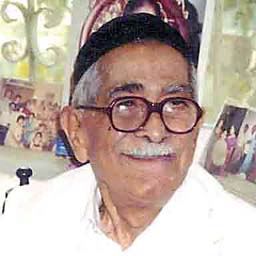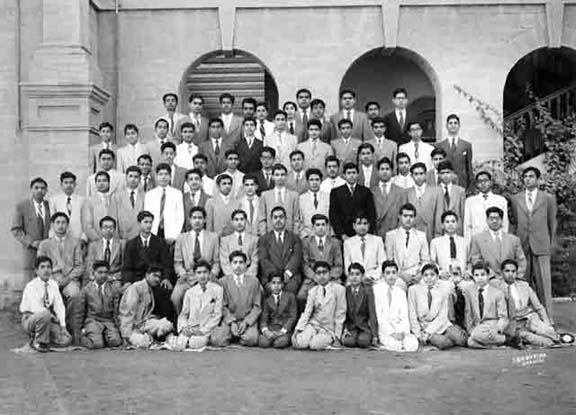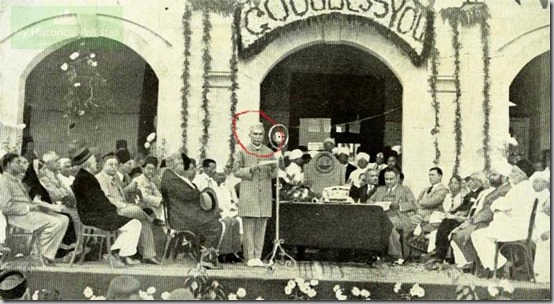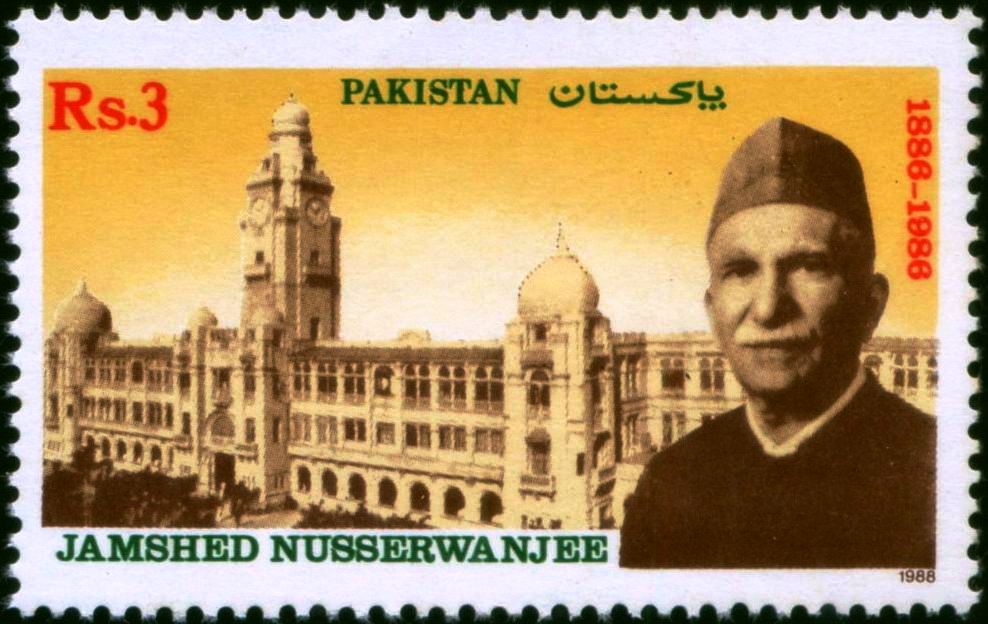The below is a short compilation of some of the prominent Parsis of Karachi, Pakistan. This write up was compiled and forwarded by Phil Masters of Canada.
Baba-e-Karachi "Jamshed Nusserwanjee Mehta the first elected Mayor of Karachi
Jamshed Nusserwanji Rustomji Mehta was born on January 7, 1886, in a well-off Parsi family in Karachi. He received his early education at Parsi Rabadi School after which he joined the N.J.V. School and in 1900 joined D.J. Sindh College for further education.
Like other Parsis, his father too had large businesses which included a retail shop at Elphinstone Street, salt factory, tile factory, flour mill, ice factory and a large wholesale shop for provisions and liquor. To fulfill his father’s wishes he decided to join the family firm, Nusserwanji & Co., to learn the business but before that he joined Daver’s Commercial College, Bombay for training as a business executive.
Jamshed Nusserwanji’s first appearance in public life was when he entered the Karachi Municipality which he served for six years as councillor. He further represented the Parsi community in the municipality for 12 years, from April 1922 to October 1933, as elected president. Besides this he had the honour of being elected the first mayor of Karachi from 1933 to 1934.
During his presidency and mayor-ship Karachi turned from a fishing village to a well planned city and developed economically and socially.Jamshed Nusserwanji was a practical person, and only acted after considering the situation thoroughly but once he started to work he would not give up till the task was accomplished. It can be said that it was his sincerity with his work that made him achieve whatever he did. The growth and development of his place of birth are because of the fact that he never bypassed rules and regulations and always observed them strictly.
In Karachi Municipality he got opportunities to channel his creativity and high abilities. Under his guidance a small and unimportant city turned into a well planned metropolis and the cleanest city in the East. Its broad streets, lights, sanitation and water system, shady trees, parks, libraries, hospitals, schools, maternity homes, veterinary homes, transport system water troughs for animals, welfare centres for the sick, the delinquent, the deaf and mute, the abandoned and even for animals spoke of the city’s progress. People of my uncle’s age cannot forget the fact that the streets of this city were washed twice a day.
Writer Zahida Hina also misses the water troughs. At the launch of Naseer Ahmad’s book at the Karachi Press Club recently, while recalling the area in Karachi where she grew up, she said “Ab yehan janwaron ko pani pilanay ka riwaj nahin raha”.
Jamshed Nusserwanji, being a businessman, took great interest in improving the business of the city, and paid great attention to its trade, commerce, insurance and banking sector. He also worked to promote its import and export. Karachi soon caught the attention of visitors from all around the world, attracting business, trade, education and culture, till it became the Federal Capital of Pakistan after Partition.
Jamshed dedicated his whole life to the service of humanity without any distinction of caste and creed. Being generous by nature he was always ready to help the poor and the needy and acted as a benefactor of helpless people.
Jamshed Nusserwanji lived his whole life for others and all those who came in contact with him received his love and affection. After playing his role for the betterment of society he passed away on 1st August 1952. In return for his social and welfare work he never looked for any reward from society but his immense contribution earned him the title of “Builder of Modern Karachi”.
******************************
Behram (Behli) Sohrab H. J. Rustomji (1912-2002)
Educationalist, Musician, School Principal, Author, Social Worker

Behram S.H.J. Rustomji was born in Karachi in 1912, the son of Sohrab and Tehmina Rustomji. The Rustomji family roots had been established in Karachi by Seth Hormusji Jamshedji Rustomji, who during the second half of the 19th century was popularly known as the “Merchant Prince” for his business acumen and for the fame he brought to the Karachi Parsee Community by employing hundreds of Zarathushtis. Throughout Behram’s life and career, he carried the names of his father Sohrab, grandfather Hormusji, and great-grandfather Jamshedji, as initials S.H.J. in all his writings. This was his way of showing respect and pride.
Behram (fondly called Behli) was an average student at the Bai Virbaiji Soparivala (BVS) Parsi High School, but loved participating in all the extracurricular activities. A student of Dr. Maneck Pithawalla, the then principal of BVS Parsi High School, Behli later became Pithawalla’s colleague as a teacher and vice principal, and finally his successor, when he donned the mental of his mentor.
After completing his matriculation and a short teaching period, Behli proceeded to UK in 1935 for further studies and obtained a BA in education from Goldsmith College, University of London. He also took courses at the Royal College of Music and attended summer school at Cambridge. Within a year of his return from UK, Behli married Gool Desai.
When Behli became the principal of BVS Parsi High School in 1946, it was a year before the partition of the Indian subcontinent and the impending influx of millions of Muslims. With the agreement, understanding, and blessings from the first president of Pakistan and father of the Nation – Mohammad Ali Jinnah, the school opened its doors to thousands of Muslim immigrant students.
During 1947, when the nation of Pakistan was established, the country was in search of a new Pakistani national anthem to replace ‘God Save the King’. A family friend of Behli, Mr. Chagla had just put together and composed the anthem with inspirational words and an accompanying melody. While visiting Behli’s house, he hummed and tried out the tune for Behli. At once, Behli played it on the piano, and hence earned the distinction of being the first individual, a Zarathushti, to play the tune of the newly created Muslim nation of Pakistan. The family piano on which Behli played the Anthem (a gift by Behli’s late father Sohrab to his wife Tehmina) is indeed a valuable piece of history!
Behli’s vision of the ideal school environment was keeping a fine balance between the required educational syllabus and his passion for extracurricular activities. He strongly believed that academics without extracurricular activities would not give students a competitive edge and therefore made sure that all students, irrespective of individual impairment and interest levels, were given opportunities and encouragement to participate fully. In fact, Behli took the personal responsibility to see that each and every student during their senior years got his fair share of both. Academically, the BVS Parsi High School was among the best in the metropolitan city of Karachi. The tradition of excellence continues today, and it is one of the most sought after schools in the nation.

Behram "Behli" Rustomji in Parsee High School, Graduating Class of 1956
Behli strongly believed that exposing a student to the ‘world’ was as important as learning textbook material, attaining high grades, and passing exams. He therefore brought the ‘world’ to the classrooms and assembly halls of BVS. Local, national, and international dignitaries, academicians, entrepreneurs, ambassadors, and high governmental officials, were all guests and frequent visitors to the school. Officials from the embassies of United States, United Kingdom, and Iran were among the most frequent visitors. They understood the value of a good well-rounded education and saw in Behli, the strong and dedicated leadership to accomplish these results and benefit the students. They provided the most up-to-date technologies in improving the school’s communication and vocational training equipment. Recognizing that not all students will pursue college careers, Behli made sure that vocational curriculum was provided for those students who chose to pursue it. BVS Parsi High School thus became one of the first high schools in Karachi, to offer matriculation with vocational training and education. BVS was also one of the first schools in the city of Karachi, to be hooked-up with a internal public broadcasting system (PBS) in each and every classroom, recreational facility, and assembly hall. World famous institutions like the US-based Ford Foundation, and the UK-based British Council provided monetary and material support (books, equipment, fixtures, furniture, etc.) to the school, once again, mainly due to their strong respect and high opinion of Behli’s educational commitment. Some experienced teachers were sent to UK, not only to specialize in their areas of expertise, but also to teach as guest teachers in UK schools. In interschool debates, dramatics, elocution competitions, sporting events, marching band, scouting, and ambulance brigade, the boys from BVS were always looked upon by rival schools as formidable adversaries. Behli took pride and joy in these events and made sure that the boys lived up to the high expectations set by their predecessors – the old Virbaijeeites.
As a school that was founded on Zarathushti values & principles, religion played an important part in the daily running of the school. Behli believed in daily morning prayers for all the students before the commencement of the classes. Praying took place in separate prayer halls for the Zarathushtis, Muslims, Hindus, and Christians students – a unique multi-faith activity with equal respect and tolerance for all faiths.
In the 19 years he served as principal, Behli preferred to be addressed as Headmaster or Sir rather than Mr. or Principal, a preference resulting from an affinity for British tradition. Behli resigned as principal of BVS Parsi High School in 1965 to pursue other educational and scholarship activities in Pakistan. With his wife Gool, he co-authored a translation of “Dastur Dhalla – An Autography” from Gujarati into English. In 1940, Behli published a book titled, ‘Teachings of Zarathushtra’ and his last publication was titled “Karachi (1839-1947).”
In addition to his fulltime profession of teaching, Behli was actively involved with many community associations such as Karachi Parsi Collegiate Union, Young Men’s Zoroastrian Association, Karachi Parsi Institute, and Dastur Dhalla Memorial Institute. Behli was on the managing committee of Karachi Theosophical Society, the Pak-Iran Cultural Society, Sind Boys Scouts Association, Pakistan-United Nations Organization, and various educational bodies. He was instrumental in organizing the first All Sind Educational Conference and played an active role during the visit of the Mohammad Reza Pahlavi – The Shah of Iran to Karachi. He initiated the Duke of Edinburgh Award Scheme at the Rangoonwalla Center, a foundation he had assisted in forming earlier. Behli was also was the motivator and organizer of nine youth conferences, countless concerts, annual scout expositions, and producer & director of many musical shows.
It would be difficult for Behli to say whether his first love was education or music, as he has given as much of himself in the line of music, as education. He composed many songs in English and Gujarati which are still sung and remembered, including the Zarathushti prayer – Ashem Vohu. Behli was blessed with a great “musical ear” and after hearing something just once, he could reproduce it on the piano, making it sound like a well-composed concerto. He was most comfortable at the keyboard and presented himself as an accomplished pianist. One of his favorite and most played pieces was the so-called ‘Parsee Anthem’ (composed by his late mentor Dr. Pithawalla), which he enjoyed playing with gusto on the piano and singing enthusiastically in his baritone like voice, while directing the school’s chorus (sung on the music of Sir Edward Elgar’s Land of Hope and Glory from Pomp and Circumstance March, No.1 in D):
Children of the Royal Race of Noshirwan,
Rally round his banner, sing of old Iran
Charity and Ashoi, these are watch-words true,
Mazda Lord of Good Mind, ever will save you,
Mazda Lord of Good Mind ever will save you.
A hero-worshipper at heart, his three mentors, Dr. Maneck B. Pithawalla, (DSc, FRGS, principal of BVS Parsi school from1920 to 1946); Shams-ul-Ulema Dastur Dr. Manckjee N. Dhalla, (PHD, D Litt., High Priest of Pakistan from 1909 to1956); and, Jamshed Nusserwanji Mehta, (Mayor of Karachi in 1933) had molded and impacted Behli’s life to a great extent. Pithawalla exposed Behli to the noble profession of teaching, Dhalla taught Behli the practice of the Zarathushti principles of truth and good mind, and Nusserwanji (Mehta), showed Behli the trait of helping mankind through social work and charity. The three gurus shaped and guided Behli’s life and in turn, the lives of the thousands of pupils who benefited from Behli’s wisdom, amiability, and actions.
Throughout his life, Behli remained a man of high principles and strong convictions. His work ethics include non-discrimination at all levels, fairness, truth, honesty, hard work, and shunning people who indulged in politics, especially when the stakes impacted the education and welfare of his pupils. He never compromised on these principles and remained committed to his vision at all times.
During his golden years and in spite of his failing health, Behli remained active by writing regularly in magazines and journals like the Mumbai-based Parsiana and Jam-e-Jamshed, US-based FEZANA, and Karachi-based OSHAO, What’s On, and Parsi Sansar. He was ready to give his wise council to those who sought it, always using the principle of ASHA as his guide.
Behli Rustomji passed away on December 14, 2002 at the age of 90 in Mumbai. He now joins his beloved wife and life partner, Gool, and leaves behind three accomplished daughters, Roshni Rustomji of California, Armaity Desai of Mumbai, and Soonamai Dessai of California.
His pupils around the world will always remember him with respect, admiration, and fondness, and carry with them the torch Towards That Best Light.
Founders of Mama Parsi Girl’s Secondery School Karachi.
1. The Late Khan Bahadur Ardeshir Hormusji Mama.
The generous contribution of Rs.3,00,000/- by our philanthropic founder was largely responsible for the establishment of this palatial building on M A Jinnah Road. Khan Bahadur regarded life as a duty and spent all his wealth in the welfare of fellow human beings. He took a lot of interest in the civic life of the city and was also the mayor of this metropolis. He had overflowing enthusiasm to serve and give. This prince among men left us in 1952 and his place was taken up by his loving daughter-in-law, Mrs. Mehra Z Mama. The kind lady, inspite of ill-health, looked after the school for nearly two decades. She visited the school nearly every week and attended to all the problems personally, even visiting the Directorate and Inspectorate of Schools.

The Late Khan Bahadur Ardeshir Hormusji Mama
2. The Late Nowroji Nusserwanji Pochaji.
The great Jamshed persuaded his father K B Nusserwanji R Mehta, the sole trustee of ‘N N Pochaji Trust’ and obtained a munificent donation of Rs 1,35,000/- for the construction of The Mama Parsi Girls’ High School. The Parsi community owes a debt of gratitude to Seth N N Pochaji.

The Late Nowroji Nusserwanji Pochaji.
3. The Late Seth Edulji Dinshaw And Family.
Seth Edulji Dinshaw from the beginning of the century was anxious to start a Parsi Girls’ School. His two offers, one in 1903 and the other in 1911, did not materialise as mentioned above. Finally he donated a handsome sum of Rs 75,000/- and started a hostel in the School for Parsi girls. The Dinshaw family contributed lavishly in maintaining this hostel to the last day of its existence. The family is even today, an ever-ready, generous benefactor of the School.

The Late Seth Edulji DinshawMINWALLA, Cyrus Framjee.
“….A prominent citizen of Karachi who has left a legacy of unsurpassed usefulness…well-noted for coming to the rescue of people in trouble even at the sacrifice of his own business…always and unreserved assisted the needy with ‘open hands. ..”
During the Indo-Pakistan War (1965) established several medical centers, besides creating an Armed Forces Relief Fund. A pragmatic personality remained actively concerned with civic causes and welfare services, with effective liaison with the KMC and the Karachi Cantonment Board for the purpose. Took a pioneering lead in sponsoring the Lions Club Movement in the country. Also pioneered the establishment of housing projects of his Parsee community besides constructing two halls for their social activities. Was spiritedly associated with many social, cultural and welfare activities and respective voluntary bodies.

